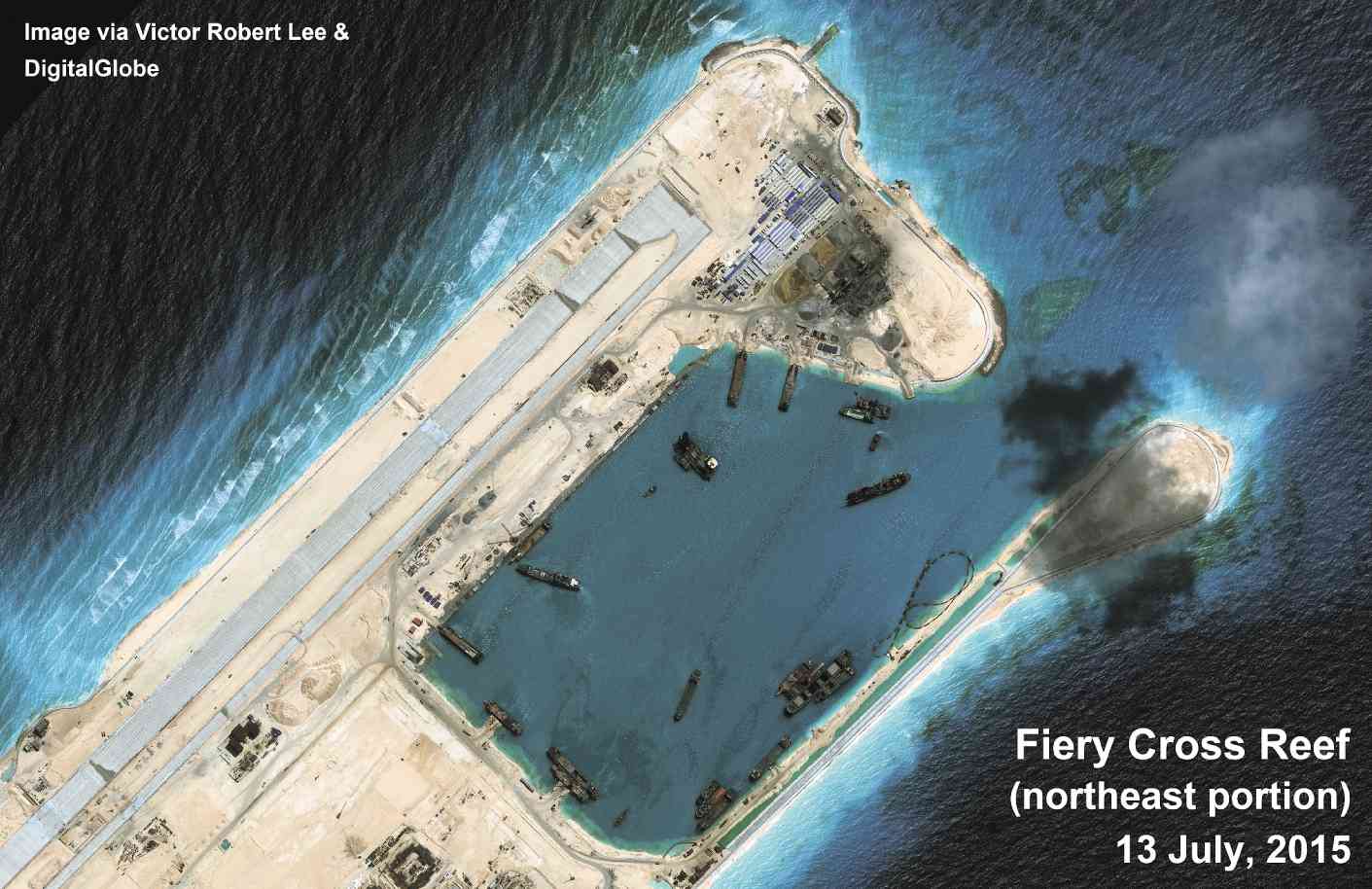
Photo from the air shows construction activities undertaken by China on Kagitingan Reef (Fiery Cross Reef), including an airstrip, in a disputed area in the South China Sea. The Philippines and China are among several countries disputing ownership of the reefs located on the Spratly Islands. PHOTO BY VICTOR ROBERT LEE AND DIGITALGLOBE
SANYA, CHINA – Except for a few transient fishermen living in wooden huts, the tranquil shores of Woody Island were for decades largely devoid of inhabitants or civilian facilities.
Then, in 2012, it all changed for the biggest island of the disputed Paracels in the South China Sea.
That year, China – which controls the archipelago – established the Sansha city government, giving it the authority to “govern” the South China Sea islands and surrounding waters. Soon after, it added a library, a school, a hospital and even a satellite TV station, in an area half the size of Sentosa. Cafes and supermarkets line its main thoroughfare, Beijing Road.
The Chinese call the island Yongxing, or “eternal prosperity”, and it now has more than 1,000 residents, as China moves to solidify its claims in this and other disputed areas of the South China Sea.
Such rapid developments have shone a spotlight on Hainan, the country’s southern-most province, whose geopolitical importance has risen in tandem with the tensions in the region.
Hainan not only administers Sansha, but is also home to Yulin Naval Base and its submarine bunker, located mere kilometres away from crowded tourist beaches of seaside resort Sanya.
Such oddities have led some to dub Hainan – roughly the size of Taiwan – as having “a curious blend of beaches, babes and naval bases”. But experts have no doubt about the island’s strategic significance.
“Hainan is the tip of the naval spear vital to China’s projection of power,” noted Beijing-based security analyst Xie Yanmei from the International Crisis Group.
The province hosts China’s conventional and nuclear submarines, and is likely to host its aircraft carriers as well, she said.
“China’s recent build-up of outposts in the South China Sea is partly aimed at making spying on the Hainan bases riskier and more complicated, and stretching the depth of defence to shield Hainan,” Xie told The Straits Times.
Hainan’s importance to China’s national security prompted the launch of the country’s first 24-hour anti-spying hotline in the province last year. According to Chinese media reports, the hotline aims to crack down on “foreign intelligence networks keen on knowing China’s military capabilities”.
Hainan could also play an important role if China decides to declare an Air Defence Identification Zone (ADIZ) over the South China Sea, noted senior fellow Ian Storey from the Iseas-Yusof Ishak Institute. As recently as last week, China defended its right to do so.
“If China declares an ADIZ over northern parts of the South China Sea, it could be administered from either Hainan or the Paracels,” Professor Storey said.
Yet, Hainan is not just about military hardware. Elsewhere on the island, its fishermen are tasked with protecting China’s sovereignty through their frequent fishing trips.
In Sanya, a passenger cruise ship has been offering nationalistic tours of the Paracels since 2013.
All these moves are aimed at safeguarding China’s interests – and more such measures can be expected in the coming months.
Sansha’s deputy mayor Feng Wenhai said in January that the authorities will start to operate civilian flights, build judicial courts and provide full Wi-Fi coverage on Woody Island this year, as the city gears up to celebrate its third birthday.
“Hainan’s officials have for years been the most ardent advocates for more aggressive development of the South China Sea,” noted Ms Xie. “They often argue that such actions are vital to the defence of China’s sovereignty and maritime rights.”
RELATED VIDEOS